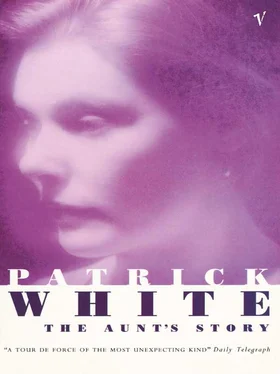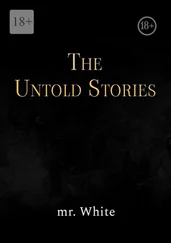Seen from the solitude of the house the process of disintegration that was taking place at the foot of the mountains should have been frightening and tragic, but it was not. The shapes of disintegrating light protested less than the illusions of solidity with which men surround themselves. Theodora now remembered with distaste the ugly and unnatural face of the Johnsons’ orange marble clock. Because the death rattle of time is far more acute, and painful, and prolonged, when its impermanence is disguised as permanence. Here there were no clocks. There was a time of light and darkness. A time of crumbling hills. A time of leaf, still, trembling, fallen.
In the house above the disintegrating world, light and silence ate into the hard, resisting barriers of reason, hinting at some ultimate moment of clear vision. Theodora experienced a fresh anxiety. She doubted whether flesh was humble enough. She was afraid that the ticking of her eyelid might distort. She was ashamed of the inadequacy of the intermediate furniture. So that she went quickly downstairs, her feet and heart, to do the things she had seen women do in houses. She swept back white ashes from the hearth with an old broom that was still lying in a corner. Unbolting doors and windows she opened the house to the air. With some love she arranged a chair and table which at least were the essential of chair and table. Then she laid sticks and after breaking several matches, which she had in an emergency box in her practical handbag, she made the little tender tongue of fire that would soon consume a great deal of doubt.
Afterwards she sat back on her heels and looked towards the door, where she saw that a man had come, without coughing.
‘Evening,’ the man said. ‘It’s a steep climb up.’
He came and sat in the chair which Theodora had put.
‘I did not notice,’ she said.
‘It’s still a stiff climb.’
She heard his breathing, and saw the attitude of his body, both of which suggested he would stay. The man with the relaxed body might even have prior claim to the house.
‘And this chair was always uncomfortable,’ he said. ‘It has a little rail with two carved knobs which eat into the back. But perhaps you have not yet experienced this.’
‘Then I am an intruder in your house,’ said Theodora.
She sat meekly on her heels beside the fire, which had grown, it had begun to complicate.
‘It is yours,’ said the man.
He had not two thoughts on the matter, it appeared. Or else the decisiveness of his words was accentuated by his changing position, to extricate from his pocket a pipe, which he began to fill.
Theodora did not know what to do now, whether she should thank, or whether it was not expected. Whether even the man’s largeness of gesture might not be an instance of inverse imposture. But she got up off her heels, as her toes had grown numb. Outside, darkness was thickening, under the black pines, which would soon be solid with darkness, and in the shifting valleys. The little fire possessed the room of the house. It recreated the faces of Theodora Goodman and the man. She sensed her own, but she saw the face of the man, whose skin was ruddy fire.
‘My name is Holstius,’ he said, watching the fiery particles of his pipe, which he had lit with a stick.
Theodora touched the table for greater precision.
‘I have seen you somewhere perhaps,’ she said. ‘Somewhere on a railway station, or in a hotel.’
‘Possibly,’ he said.
But it was a possibility, it seemed, into which he did not intend to go. He drew deeply on his pipe, and the bowl flowered. He was greatly interested in this.
In spite of his detachment Theodora was not conscious of isolation. Looking at Holstius, she remembered the morning on the bridge at Meroã, watching the cold brown water flow, at the shaggy side of the Man who was Given his Dinner, and how at the time she had been infused with a warmth of love that was most thinly separated from expectation of sorrow.
‘They are very thinly divided indeed,’ Holstius said. ‘In fact, you might say that expectation of happiness is expectation of sorrow. The separating membrane is negligible.’
Theodora held the edge of the common table with her fingers. His voice moved her with a deep sadness. He was both detached and close. Because, although he spoke in abstractions, these answered the depths of her being. And what made these sensations of love and sorrow more poignant, actual, wonderful, was that she could have touched the body of Holstius, his thick and muscular, but quiet and soothing, hands, the ruddy skin, the indication of bones, the coarse greyish hair, the eyes, of which the expression was not determined by passion. Walking with her father on the frost at Meroã, or sitting with him in his room, in which the pines were never quite still, she had been impressed in the same way at times by a congruity, a continuity of man. But at times, at times, when expectation exceeded fact. Death had taken George Goodman and put him under marble. Fact corrected expectation. Just as the mind used and disposed of the figments of Mrs Rapallo, and Katina Pavlou, and Sokolnikov. And now Holstius. She watched the rough texture of his coat for the first indications of decay.
You suspect me,’ Holstius said.
He spat into the fire. She heard the strong hiss of spittle.
‘I suspect myself,’ Theodora said, feeling with her fingers for the grain in the table.
‘Yes,’ he said, ‘you have been groping that table like a blind thing for the last ten minutes.’
Then she began to hate the revealing honesty of his face. She dug her nails into the wood.
‘Why,’ she asked, ‘am I to be subjected to these tortures? I have reached a stage where they are not bearable.’
Her breath beat. The walls were bending outward under the pressure of the hateful fire. Then, when the table screamed under her nails, he said quietly, ‘Ah, Theodora Goodman, you are torn in two.’
‘What is it,’ she asked agony, ‘you expect me to do or say?’
‘I expect you to accept the two irreconcilable halves. Come,’ he said, holding out his hand with the unperturbed veins.
She huddled on the boards, beyond hope of protection by convention or personality, but the cloth on the legs of Holstius had the familiar texture of childhood, and smelled of horses, and leather, and guns. She rested her head against his knees.
‘You cannot reconcile joy and sorrow,’ Holstius said. ‘Or flesh and marble, or illusion and reality, or life and death. For this reason, Theodora Goodman, you must accept. And you have already found that one constantly deludes the other into taking fresh shapes, so that there is sometimes little to choose between the reality of illusion and the illusion of reality. Each of your several lives is evidence of this.’
Resistance had gone out of her as she lay, her head against the knees of Holstius, receiving peace, whether it was from his words, and she was not altogether sure that he spoke, or from his hands. His hands touched the bones of her head under the damp hair. They soothed the wounds.
Later it seemed to be morning where her head lay. There was a weal on her cheek where the chair had eaten, numb but not painful, for she was in no such inferior state to experience pain. Light was beginning. It was already yellow, but not yet strong. Theodora turned her head and saw the brown bird with the velvet eye. Even at close quarters it was not critical, and might even have perched on the rail of the chair, of whose inanimacy Theodora Goodman was still a mere extension. Only when she drew her legs across the boards to restore her body to its working shape, the bird lifted its immaculate feet, bunched, trod the air, still undecided whether to settle, drooped, gathered, flirted its wings, opened out, and flew through the door. Then Theodora made the additional effort and stood on her feet. The numbness of her whole body left her with intensely clear vision. The almost empty daylit room had a pleasing innocence of detail and shape.
Читать дальше












